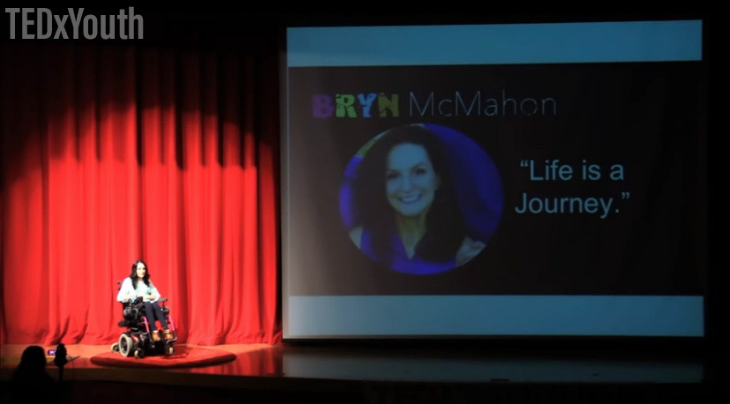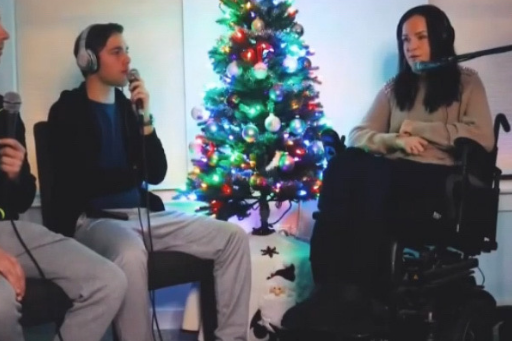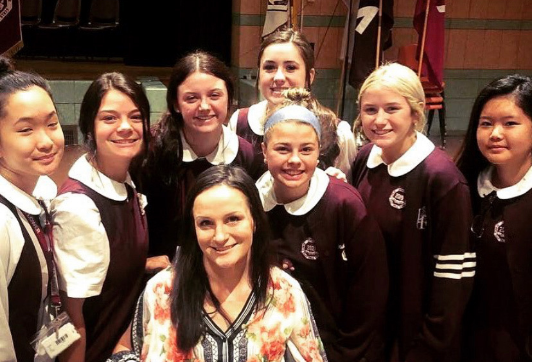Suicide Survivor Bryn McMahon
Shares Her Story
Take the first step, Contact Us Today
CALL 844-470-0410
The following article talks about topics like suicide and depression that may be triggering for some people.
If you are feeling suicidal, please call the National Suicide Prevention Lifeline at 800-273-8255
Suicide Survivor Bryn McMahon Shares Her Story
For some 15-year-olds, their biggest worry is getting their driver’s license or doing well on a math test. While these teenage quandaries may seem trivial, for some people they can feel like a heavy burden.
One night in 2010, 2 weeks before her 16th birthday, Bryn McMahon reached her breaking point. She decided that the only way out was to commit suicide and describes her decision as almost instantaneous.
On that fateful night, Bryn stepped in front of a train hoping that it would end her life, but instead it changed her life forever.
When Bryn woke up in a hospital, she was paralyzed from the chest down. She couldn’t remember how she got there or how she was saved. When she had made the decision to step in front of the train everything went black, but she was still here.
“I would love people who suffer from depression to realize that there is so much more to you. Your depression is one little tiny piece of you.”
Bryn McMahon Speaks About Depression Awareness
Now a suicide survivor, Bryn McMahon has found new purpose and is using her story to empower others, raise awareness, challenge stigmas, and make talking about mental health normal. If just one person doesn’t have to go through what she went through, then she says sharing her story is worth it.
Harmful Stereotypes About Depression
The stereotypes surrounding depression and mental illness can be a big hurdle to getting people care.
Bryn McMahon was not what comes to mind when people think about depression. On the outside she appeared to be a normal teenager. She was outgoing, into sports, and had a lot of friends. The night she had attempted suicide was the day after her cheerleader team had won a cheerleading competition.
Bryn even admits, “from the outside looking in, I had an amazing life.” But on the inside, she was fighting demons that were stewing below the surface, unbeknownst to anyone else.

Bryn McMahon is not alone. Over 264 million people around the world struggle with depression, but a large majority of these people don’t get help.1
What many people do not understand is that depression isn’t just emotional; it is biological and involves a chemical imbalance in the brain. For teenagers and young adults especially, even recognizing that they are struggling with depression can be a challenge.
“Being so young you don’t realize that the things that you’re feeling aren’t just normal teenage drama…Everyone saw me as a happy person, but inside I was really struggling, and I had no idea that people didn’t think the way I did.”
Because Bryn didn’t fit the mold of someone with depression and she didn’t share her feelings, Bryn’s family and friends didn’t recognize her depression until after her suicide attempt. Unfortunately, this story is all too common.


There is a lot of stigma surrounding depression, and the stereotypical image of depression can be vastly different from what depression actually looks like. Bryn explains, “It is easy to see ‘depressed people’… but people who are super happy can be depressed too. Depression comes in many shapes and forms, and it can affect literally any person.” Because of these misconceptions, cases of depression, like Bryn’s, can often go unnoticed until they become dire.
Bryn wants to remind people that “Everyone’s perspective is different… With the pressures of school and family and just everyday life…Looking back, these things seem insignificant, but in a 15-year-old mind, they’re overwhelming.”
The Importance of Asking for Help
At 15, Bryn didn’t know where to turn. “I didn’t have the resources, or anything like that, or the know how to reach out to get the help that I needed, so one day you think that your life would be better if you weren’t there. And you think that everyone else’s life would be better if you weren’t there.”
Unfortunately, many people struggling with depression feel this same way and are afraid to ask for help, but Bryn emphasizes that you need to be your own advocate.
While Bryn recognizes that this can take a lot of strength and vulnerability, she explains that being your own advocate “is really what is going to save you because everyone else has things going on in their life. Whether they want to help you or not, sometimes they may not even recognize that you need help…Most times people aren’t going to go out of their way to say ‘hey, are you okay?’ unless you are the one saying, ‘hey, I am really not okay.’”
It was the support of others that helped Bryn bounce back after her suicide attempt and work through her depression. As much as people may not want to rely on someone else, she encourages people to find someone who they are comfortable with to talk to.
While she says she is blessed to have such supportive family members and friends, she recommends a counselor, religious leader, or other 3rd party who doesn’t have as much emotional investment in the matter because they are going to think with the clearest head.
She also says that group therapy is “a hidden gem.” While some people may be hesitant to speak about their personal troubles with a group of strangers, group therapy can connect you with other people who can relate to your circumstances and have been through something similar.
Anti-Depressants & Their Bad Reputation
Along with therapy and the support of others, Bryn still takes anti-depressants to help combat her depression and manage her symptoms.
Like many others, she was hesitant at first, and admits “I didn’t want to take them because of the stigma around medication.” She mistakenly believed that taking medication would make her only experience happiness but now understands that this is not the case. She explains that “it helps you really balance your emotions the way they should be.”
Although you can’t see it the way you can a broken bone or cut, depression is physical as well. It involves a chemical imbalance in the brain, and medications are a way to help stabilize these chemicals so that everything is working the way it is supposed to.
Bryn hopes that the more people are able to understand the science behind depression and what is happening in the brain, the more comfortable people will be with taking medications if they need them.
Healing Is A Lifelong Journey
Although Bryn first grappled with depression at 13, she didn’t recognize what it was until right before her suicide attempt. Since that time, Bryn has come a long way. While she still struggles sometimes, she recognizes that dealing with depression is a lifelong journey and explains, “Depression is not one of those things that just goes away…Your depression or mental illness can evolve with you as you get older and you have new challenges in life.”
Because of these new challenges, healing is also a lifelong learning process. It is important to recenter yourself when necessary and continue to work on gaining new tools that can help you when times get tough.
If you are not sure where to turn, Bryn and our team at Vertava Health want to remind you that there are people everywhere who are willing to help you, but you just have to ask. You can reach out to Bryn on Instagram at @brynagainstthestigma for support. Our care team is also available 24/7, and everything you say is confidential.
Interview conducted by: Chelsea Woodruff
Suicide is never the answer. Need to talk to someone?
100% Confidential

